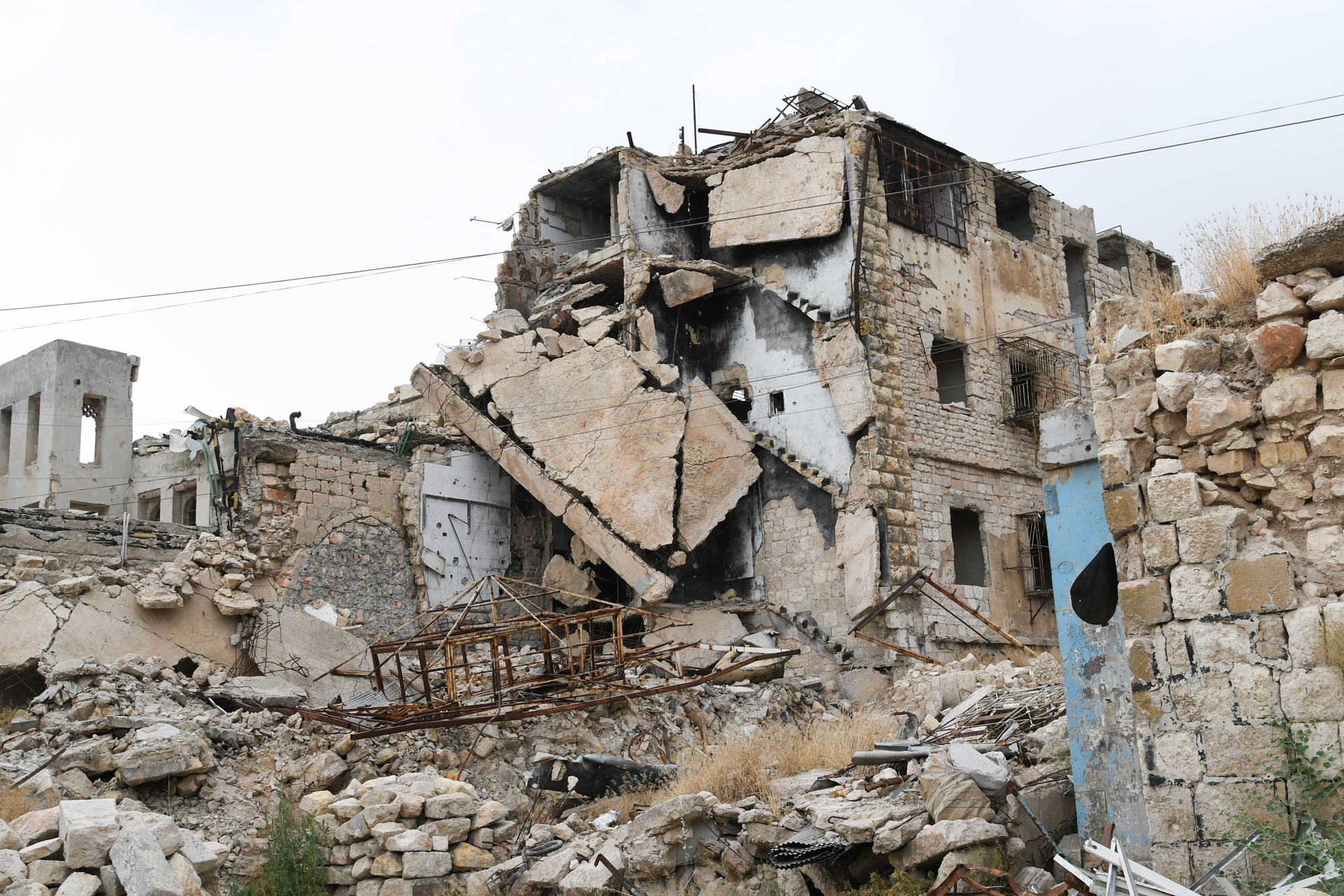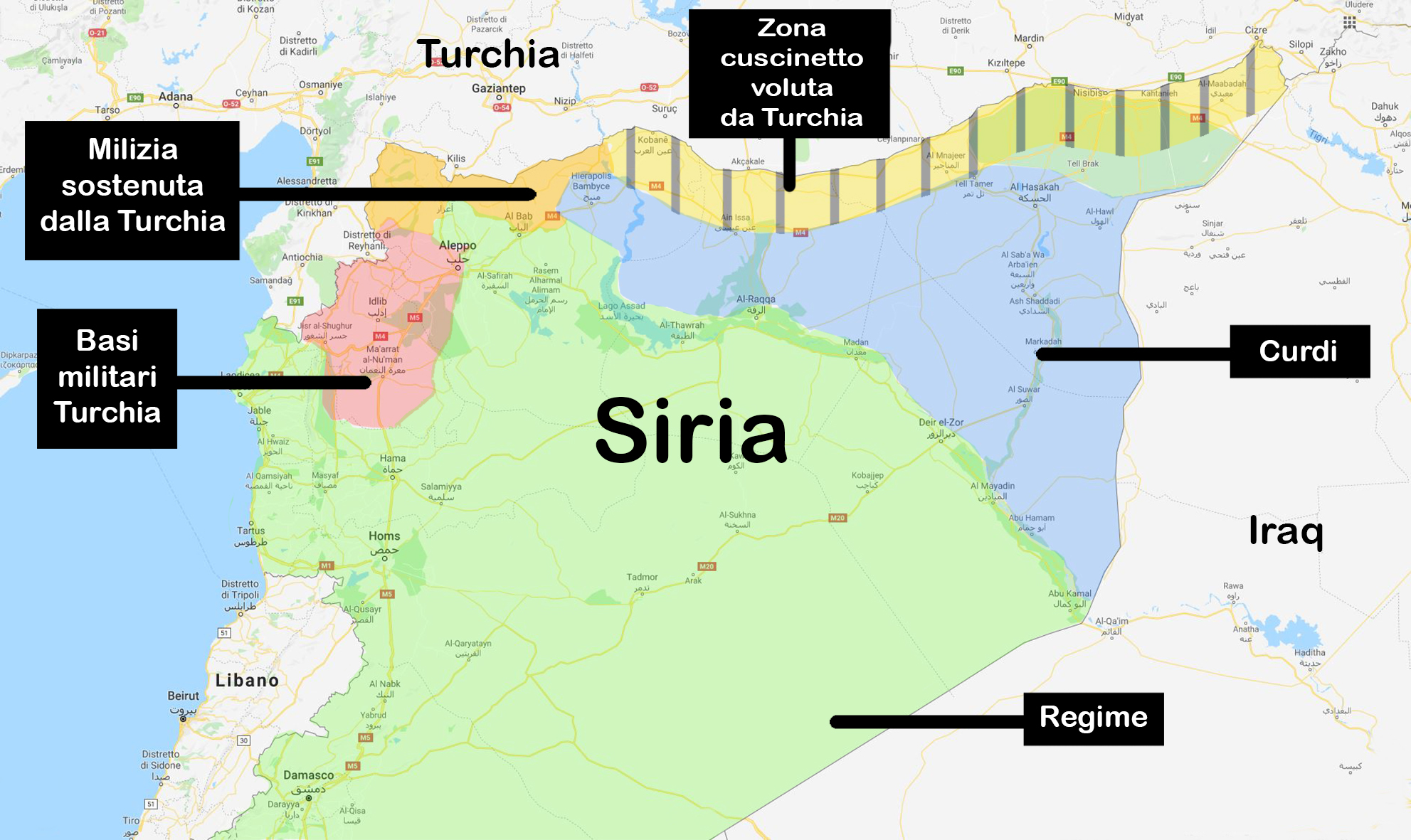WAR
After the US – partially backtracked – green light, Turkey is preparing an invasion of northern Syria. Syrian Kurdish PYG/YPG militia are on alert and prepared for battle although they don’t rule out concerted anti-Turkish action agreed with Damascus’ government. The risks of an escalation of the Syrian conflict and the revitalization of ISIS. Interview with Alberto Gasparetto, author of the monograph “La Turchia di Erdogan e le sfide del Medio Oriente – Iran, Iraq, Israele e Siria”

The day after the announcement of an imminent Turkish operation near the border and after the green light given by the United States to Turkey’s government, as yet the situation in north-east Syria is seemingly quiet. Syrian Kurdish PYG/YPG militia are on alert in the whole area. From Turkey there are no signs of a thaw. The Turkish Ministry of Defence announced today in Ankara that preparations for an offensive against the Kurdish-Syrian militias had been completed and reiterated that Ankara “will never tolerate the creation of a terrorist corridor along the border.” The creation of a safe zone, where at least two of over 3.6 million Syrian refugees in Turkey today are to be relocated, “is necessary to secure the lives of Syrians while contributing to peace and stability in our region”. The Turkish Armed Forces are only waiting for the order from the political authorities. The various Syrian opposition factions that make up the Syrian National Army (SNA), supported by Erdogan, are in favour of the operation. Their leader Selim Idris said that the eastern Euphrates is also a part of Syrian territories, adding that “the majority of these lands are under the control of the People’s Protection Units (YPG)” that Ankara considers terrorist organizations on a par with the PKK, the Kurdistan Workers’ Party. For this reason, Idris explained, “returning displaced people to their homes and clearing their land of terrorists that want to divide Syria and are threatening Turkey’s security and stability, are our foremost duties.” On the opposite front, the Kurds are considering an alliance with President Assad against Turkey, as confirmed by Mazlum Abdi, commander-in-chief of the Kurdish-Syrian militia in north-eastern Syria. However, Iran, a historical ally of Syrian president Assad, is against any Turkish operation in north-eastern Syria. This position was reiterated by Foreign Minister Mohammad Javad Zarif in a telephone call with his Turkish counterpart Mevlut Cavusoglu in which he highlighted the respect for Syrian territorial integrity and national sovereignty. In the meantime, the US clarified that no green light was given to a Turkish military operation. In a briefing with journalists, US administration officials explained: “about 50 special operators in the area of the expected incursion would move to other locations. The fact that they are being relocated is not a formal pullout from Syria. We do not endorse such an operation.” These words reflect those tweeted by President Trump, who threatened Turkey “not to take advantage” of the situation. “As I have stated strongly before, if Turkey does anything that I, in my great and unmatched wisdom, consider to be off limits, I will totally destroy and obliterate the Economy of Turkey.” Trump’s decision to withdraw U.S. troops has been criticized also by his close allies such as Sen. Lindsay Graham, Senate Judiciary Committee Chairman, who blasted it as a “disaster in the making.” The Pentagon has also distanced itself from the possibility of a Turkish offensive in northern Syria.
We contacted Alberto Gasparetto, PhD in Political Science and International Relations at the University of Padua and author of the monograph “La Turchia di Erdogan e le sfide del Medio Oriente – Iran, Iraq, Israele e Siria” [Erdogan’s Turkey and the challenges of the Middle East – Iran, Iraq, Israel and Syria], to try and identify the possible consequences of the Turkish invasion of Syrian territory.
 “There are two possible scenarios –he said -. The first is that Turkey may actually decide to carry out a military intervention after the US withdrawal. In this case we would be faced with a dreary scenario and not just for the Kurds. Turkey would itself be involved in another military campaign after the one it has been carrying out in northern Iraq for several months. The second scenario is that at the moment nothing happens, as several analysts and international media are inclined to believe. In fact, Trump’s statement does not specify if and when all troops will be withdrawn. In any case, before intervening Turkey will have to wait for the complete withdrawal of US troops to avoid incidents.”
“There are two possible scenarios –he said -. The first is that Turkey may actually decide to carry out a military intervention after the US withdrawal. In this case we would be faced with a dreary scenario and not just for the Kurds. Turkey would itself be involved in another military campaign after the one it has been carrying out in northern Iraq for several months. The second scenario is that at the moment nothing happens, as several analysts and international media are inclined to believe. In fact, Trump’s statement does not specify if and when all troops will be withdrawn. In any case, before intervening Turkey will have to wait for the complete withdrawal of US troops to avoid incidents.”
Could Turkey be adopting a wait-and-see policy?
Trump’s Tweeted threat to obliterate Turkey’s Economy should he use a heavy hand, could feed into Turkey’s wait-and-see strategy. It should also be remembered that
The Kurds have a weapon at their disposal: ISIS detainees are held by Kurdish forces.
The same ones Trump will consider Turkey accountable for.
What could be Russia’s reaction, an ally of Assad, to the feared Turkish invasion of Syrian territory?
Putin will wait for Turkey to make the first move in order to see if it could be exploited in geopolitical terms. I doubt that Russia will be able to intervene, as it is already controlling the western front. The Kurds are bound to react – as they have already clearly stated.
Having been dumped by the U.S, could they fall under Russian-Syrian influence?
An agreement with the Russians and with Assad is possible, as some statements by Mazlum Abdi, commander-in-chief of the Kurdish-Syrian army in north-eastern Syria, would suggest.
A possible agreement with the Kurds could be advantageous for Russia in geopolitical terms.
 But this will rekindle the ever-present tensions between Russia and Turkey, even though they have been shelved since August 2016. Russia and Turkey remain two geopolitical rivals, they are not strategic allies. They only established a specific strategic agreement on Syria.
But this will rekindle the ever-present tensions between Russia and Turkey, even though they have been shelved since August 2016. Russia and Turkey remain two geopolitical rivals, they are not strategic allies. They only established a specific strategic agreement on Syria.
Iran, another ally of Assad’s Syria, voiced opposition to the Turkish operation. Is there any prospect of a Kurdish-Iranian agreement?
I don’t think that an understanding with Iran, which always considered the Kurds as an enemy to be fought on a par with Iraq and Turkey, is feasible. Especially when it comes to Kurdish aspirations for independence.
What remains of the Kurdish dream to create an independent State in northern Syria?
The Kurds created the (de facto autonomous) Rojava confederation in North and Eastern Syria; a somewhat successful experiment based on libertarian socialism according to the idea advocated by Abdullah Ocalan, the leader of the PKK.
While after defeating Isis and having laid the foundations for the reconstruction of the Syrian State, the idea of preserving the Rojava might have been feasible, now the situation is much more difficult.
Could ISIS build on these new tensions and reorganize itself?
I think it could. Despite the dismantlement of its structure.
The Jihadi universe continues to exist.
There are many fighters who had joined ISIS and are waiting for the right moment to reorganize themselves. The possible vacuum that would be created with U.S. withdrawal might provide an opportunity to reconquer a lost territory and thus invigorate ISIS.
Could Trump’s move have electoral purposes? After having tried, in vain, to bring the soldiers in Afghanistan back home, Trump is now trying to withdraw the US contingent from Syria to flaunt his victory in the election campaign…
There are 13 months to go before the U.S. elections and the president needs to bring home a success in foreign policy that traditionally had a great role in the U.S. election campaigns. After the failures in Iraq and Afghanistan, and having witnessed his historical enemy, Iran, expanding throughout the Middle East, now the withdrawal from Syria can serve to save face. I’m not sure whether Trump’s move is a sensible one.
By moving away from the Middle East, the US president risks handing over the entire region to rivals like Russia and to enemies like Iran. The most disruptive decision in this respect is the unilateral withdrawal from the Iranian nuclear deal.